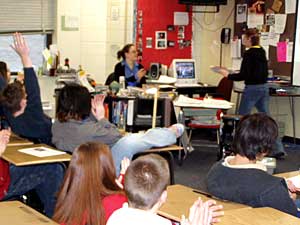|
Photos
More from MPR
Your Voice
|
Teaching the legacy of Martin Luther King, Jr.
January 18, 2004
 |
| Students in Meredith Abbey's social studies class make civics presentations. (Brandt Williams) |
Bloomington, Minn. — On the Friday before the Martin Luther King, Jr. holiday weekend at Bloomington Jefferson High School, students in Meredith Abbey's social studies class are giving civics presentations. Senior Hannah Hayward holds up handmade illustrations for her presentation on the Bill of Rights.
"And the second one is the right to bear arms. That's a little NRA guy with his little gun," she says.
 | |||
Hayward says Bloomington Jefferson teachers have done a good job of familiarizing students with Martin Luther King and the civil rights movement.
"We learned about it last year in U.S. history and then in government we had a choice for our project and that was one of the things we could do," she says.
Student John Vandreuil says he remembers being taught about Martin Luther King in elementary school.
"We just recently watched Separate but Equal in class which kind of relates back to how the South was so different and the stuff King had to go through in his fight for freedom," he says.
Vandreuil says he remembers being taught about Martin Luther King in elementary school. He says each year he learns more details about King's life.
|
"If we can find a way to teach about Dr. King so that today's children and tomorrow's children will think of themselves as the equals of Dr. King. That they too can have an impact and fight for justice and make their community and their world better for their presence. That's the purpose."
- Peter Rachleff |
"[The] marches and then him spending nights in jail and the controversy it caused in the south," he says. "The discrimination and the acts of violence against his family that he encountered."
School officials say King and the civil rights movement are already mainstays of their curriculum. Teacher Heidi Jacobsen is helping Jefferson prepare to implement the new standards. She says the state-mandated guidelines will not change how King is taught in Bloomington schools.
"We don't just look at it as just one day of you know, 'here's the celebration,'" says Jacobsen. "In our curriculum, just at the high school level alone it's addressed in 9th grade civics. It's addressed again in U.S. history in 11th grade. Again in 12th grade government."
Some say that while the attention to King is good, the proposed standards pay short shrift to the social ills that inspired King to action.
"In over 22,000 words, in this 59-page standard document 'racism' only appears once. That's alarming," says Paul Spies, co-founder of Minnesotans Against Proposed Social Studies Standards.
Spies says the new standards ask teachers to include so much in their lesson plans, that he fears they may leave out or downplay the impact of white supremacy on the struggle for civil rights. He also says the standards threaten to paint a narrow portrait of King.
"Students are supposed to know about Dr. King in high school. But only within the context of the Civil Rights Movement," says Spies. "Many people know that Dr. King turned not to just the cause of civil rights but human rights and was very much an anti-war activist an advocate for world peace. But there is no mention in that standard of his opposition to Vietnam."
 | |||
Macalester College history professor Peter Rachleff says, on paper, the new standards look like they are very inclusive. He says he's glad to see some focus placed on the different Indian cultures native to Minnesota. And he says the emphasis on King is impressive. However, Rachleff says with all of King's contributions to American society, he'd like students to be able to see him as a human being.
"If we can find a way to teach about Dr. King so that today's children and tomorrow's children will think of themselves as the equals of Dr. King," says Rachleff. "That they too can have an impact and fight for justice and make their community and their world better for their presence. That's the purpose."
Rachleff says if it takes a little bit of hero-worship to get King the kind of prominence in Minnesota school standards then, he says that's OK.
The history and social studies standards still have to be approved by legislators when this year's session begins in Feb.
|
News Headlines
|
Related Subjects
|
